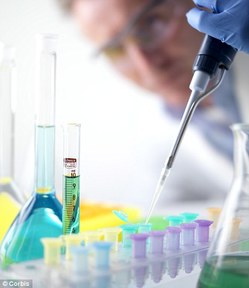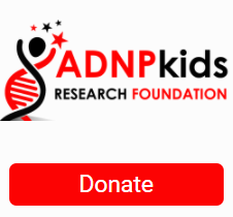INTRODUCTION
ADNP mutations may be among the more common single-gene causes of autism spectrum disorder, the fastest-growing serious development disability. Many individuals with ADNP Syndrome (also known as Helsmoortel-Van Der Aa Syndrome) present with intellectual disability, autism and global developmental delays, including delayed or absent speech. However, the full extent of ADNP Syndrome is unknown, leaving the field in great need of breakthroughs. The genomic revolution in biomedical science over the last decade has offered tremendous hope for personalized, precision approaches to treating autism and associated neurodevelopmental disorders.
There are few places better positioned to explore the opportunity to drive the field forward and develop novel treatments than the Seaver Autism Center for Research and Treatment at Mount Sinai, under the leadership of Joseph D. Buxbaum, PhD. As Director of the Seaver Autism Center, Dr. Buxbaum has created a fully integrated environment where basic scientists, clinician scientists and clinicians work together to improve treatments for individuals with neurodevelopmental disorders, all within the spirit of Mount Sinai’s characteristic focus on collaboration.
The Seaver Autism Center conducts novel studies along the entire research continuum: from basic bench work in the laboratory and animal modeling, to clinical trials with patients, to deploying innovative interventions to the community. Dr. Buxbaum's lab generated the first mouse model of Phelan-McDermid syndrome, and it has shown that the therapeutic IGF-1 reverses synaptic and motor deficits in these mice, leading to ongoing clinical trials. The Center is now a world leader in studying Phelan-McDermid syndrome, partnering closely with the Phelan-McDermid Syndrome Foundation to pioneer numerous studies to understand the genotype, phenotype and natural history of Phelan-McDermid syndrome and to explore experimental therapeutics. In addition, the Center leads studies in numerous rare genetic forms of autism and neurodevelopmental disorders, including FOXP1 syndrome and Fragile-X syndrome. We are now excited to support the Center for the study of ADNP and work toward the discovery of interventions and treatments for the ADNP community.
The success of this genetic research and precision medicine has propelled Mount Sinai to a position of international leadership in the field of autism and neurodevelopmental disorder research. Now, building on earlier promising results in related genetic syndromes, Dr. Buxbaum, along with his colleagues Alex Kolevzon, MD, Clinical Director, and Paige Siper, PhD, Chief Psychologist, plan to lead a new study that aims to understand the biology of ADNP Syndrome in pursuit of treatment targets.
Large granting organizations, such as the National Institutes of Health, do not commonly support new avenues of clinical research with extremely rare genetic conditions, so finding funding for this critical study is difficult. As a result, the ADNP Kids Research Foundation seeks philanthropic partners to be the catalyst for this novel research study. Philanthropic funding has the unique ability to fund cutting edge research and accelerate scientific progress.
INNOVATIVE NEW RESEARCH
Historically, research in autism and neurodevelopmental disorders has focused on observable clinical symptoms only. This research has yielded limited results, so scientists at the Seaver Autism Center are now focusing on understanding not only observable symptoms, but also the biology of the condition, and what is occurring at the cellular and genetic level.
The Seaver Autism Center has invested heavily in identifying and studying genes that contribute to autism and associated neurodevelopmental disorders. In addition, the Center has concentrated efforts into the development of biomarkers, which are objective tests that accurately and reliably measure specific biological processes associated with neurodevelopmental disorders. The emergence of genetic testing possibilities allows for a precision medicine approach, which will lead to the development of novel treatments in rapid and exciting ways. The use of biomarkers in this context provides a means to objectively assess even small changes, which would stimulate larger and longer duration studies. Biomarkers also provide a means to evaluate approaches to treatment.
STUDY OVERVIEW
This ambitious new study will start with approximately 10 patients in the first year and seeks to comprehensively characterize the ADNP Syndrome phenotype while investigating the neurobiological pathways that underlie ADNP Syndrome through stem cell and animal studies.
Clinical evaluation.
A detailed clinical evaluation will be completed, including medical history, psychiatric and neurological evaluation, and dysmorphology examination. Medical records will be reviewed, including magnetic resonance imaging (MRI) and electroencephalogram (EEG). Medical tests will be ordered as indicated for each individual.
Medical and psychiatric history.
A detailed psychiatric evaluation will be carried out by a board certified psychiatrist to assess current symptoms, past psychiatric history, medical history, developmental and birth history, educational history, and social history.
Neurological evaluation.
A neurological examination will be conducted by a board certified neurologist to examine cranial nerves, muscle tone, strength, gait and motor coordination, speech, sensory reactivity, and behavior. Medical records (e.g., MRI, EEG) will also be reviewed to assess the presence of seizures or brain abnormalities. MRI and/or EEG will be ordered when indicated.
Dysmorphology examination.
Dysmorphology examinations will be completed by clinical geneticists to examine physical features of individuals with ADNP Syndrome.
SPECIFIC TESTING
Autism Spectrum Disorder (ASD) symptomatology.
diagnosis will be determined using gold standard diagnostic testing including the Autism Diagnostic Observation Schedule, Second Edition (ADOS-2), the Autism Diagnostic Interview-Revised (ADI-R), and a clinical evaluation. The ADOS-2 is a semi-structured direct assessment of social communication, and restricted and repetitive behavior. The ADI-R is a structured caregiver interview that assesses ASD symptoms in the areas of socialization, communication, and restricted and repetitive behavior. A consensus diagnosis will be determined for each individual based on ADOS-2, ADI-R and clinical evaluation (DSM- 5). Caregiver questionnaires will be completed to further assess everyday functioning; measures may include the Social Responsiveness Scale, Second Edition, the Repetitive Behavior Scale-Revised, and the Sensory Profile.
Intellectual and adaptive functioning.
Global cognitive ability will be measured using an appropriate assessment based on an individual’s level of functioning. Examples include the Mullen Scales of Early Learning, the Stanford Binet Intelligence Scales, Fifth Edition, and the Differential Ability Scales – Second Edition. Adaptive behavior will be measured using the Vineland Adaptive Behavior Scales, Survey Interview Form.
Expressive and receptive language.
Language milestones will be assessed during the ADI-R and the clinical evaluation. Expressive and receptive language abilities will also be measured using the Vineland-II. For verbal individuals, the Peabody Picture Vocabulary Test, Fourth Edition and the Expressive Vocabulary Test, Second Edition will be administered.
Gross motor, fine motor and visual-motor integration.
Motor milestones will be assessed during the ADI-R and the clinical evaluation. Current fine and gross motor skills will be measured using the Vineland. Visual-motor integration will be measured using the Developmental Test of Visual-Motor Integration, 6th Edition, when appropriate. The Developmental Coordination Disorder Questionnaire will be completed by all caregivers
to measure motor control during movement, fine motor/handwriting skills, and general coordination.
Sensory processing.
Sensory processing will be assessed using the Sensory Assessment for Neurodevelopmental Disorders (SAND), which is a standardized assessment that includes a clinician-administered observation and corresponding caregiver interview. The Sensory Profile caregiver report questionnaire will also be used to assess daily life sensory experiences.
Psychiatric features.
The presence of internalizing and externalizing behavioral symptoms will be assessed during the psychiatric evaluation and through caregiver report questionnaires.
Electrophysiology & eye tracking.
Event-related potentials, visual and auditory evoked potentials, and eye tracking tasks will be used to better understand underlying neurophysiology, and to identify biomarkers and outcome measures for use in future clinical trials. Electrophysiological tasks involve placing non-invasive electrodes on your child’s head. Your child will be asked to look at patterns on computer monitors and listen to different sounds.
STEM CELL BIOBANK:
Create and store stem cells for future studies with ADNP human neuronal model systems.
The team will collect blood cells during the clinical evaluation to initiate a biobank registry. Samples from affected patients and siblings will be induced into pluripotent stem cells (from -5 families within the first year). Over the one year term of this proposal, a proportion of these stem cells (n~10) will be reprogrammed to nerve cells to better understand the neurobiology. Ultimately, these cells will be useful for testing novel therapeutics.
Induce stem cells.
The first step consists of reprogramming induced pluripotent stem cells (iPSCs) from families (one proband and one unaffected sibling, 2 clones per individuals).
We will start reprogramming as soon as we have three families with both proband and unaffected sibling available. The whole reprogramming process (from blood samples to iPSCs) takes approximately four months so we will start one reprogramming batch every four months.
The first batch will include three families, the second batch will include two new families and the repeats from batch 1 if needed (we know that approximately 20% of the samples fail the first reprogramming attempt). In subsequent years, the third batch will be reprogrammed and will include five new families and the repeats from batches 1 and 2 if needed.
Induce nerve cells.
The second steps will make use of the induced stem cells to generate neural progenitor cells and neurons (nerve cells). This is followed by sequencing RNA harvested from the neural progenitor cells’ neurons and identifying differentially expressed genes between cases and controls. Within one year from the start of this program, we expect to have generated induced stem cells from -5 families and to have generated and sequenced neural progenitor cells and neurons for 3 families. Cells from additional families will be stored and can be reprogrammed in the future.
CLINICAL TRIAL PREP
Prepare for multi-site clinical trials in ADNP Syndrome. As we continue to engage the ADNP research community and our own ADNP clinical research network, we will share findings and approaches such that a network of ADNP Centers of Excellence will emerge that can carry out large-scale multi-site research studies and clinical trials.
Establish a cohort of potential participants for future natural history studies in order to lay the foundation for future clinical trials.
ADNP-KRF RESEARCH PROJECT SUPPORT
The ADNP Kids Research Foundation supports both Phase 1 and Phase 2 outlines of this critical research.
Phase 1 will consist of expediting approximatly 10 children to launch the project over the first year of the study.
Phase 2 will consist of approximately 40 additional children.
The total project proposal is $2,000,000
PHILANTHROPIC OPPORTUNITY
Philanthropic support is CRITICAL to advance this novel research. It is in this spirit that we ask you to consider supporting the ADNP Syndrome Study at the Seaver Autism Center at Mount Sinai. This would be a monumental step forward for the understanding and treatment of ADNP Syndrome.
Donations for this project will support the cost of the full study which include the genetic and phenotypic evaluation, travel costs to enable patient families to travel and stay for their evaluation, stem cell reprogramming and downstream analyses, models systems studies, as well as all personnel and infrastructure needs.
The long-lasting impact of this study will ensure a legacy for this investment: It will lead to publications and further studies, aid our community outreach and dissemination efforts, and enrich our education and training programs that shape the next generation of clinicians and scientists.
Your support will also help leverage additional sources of funding from other philanthropic and granting
sources to ensure that further work will be sustained for ADNP Syndrome. Ultimately, this study will transform the understanding of ADNP Syndrome, advance the broader field of neurodevelopmental disorders, and provide tangible hope for therapeutics that treat the cause, not just the symptoms, of ADNP Syndrome.
We hope that you will support research for affected by ADNP Children around the world.
THANK YOU FOR YOUR CONSIDERATION.
If you would like to support this inspirational research please mail a donation to:
ADNP Kids Research Foundation
c/o The ADNP Syndrome Study at the Seaver Center
24500 NE 132nd Circle
Brush Prairie, WA 98606
*Please make sure to note on your donation that it is for the ADNP Syndrome Study at the Seaver Center. By noting this on your donation, 100% will go to the Seaver Center and will not be used for any other project of the foundation.
CLICK HERE TO LEARN MORE ABOUT THE SEAVER CENTER AT MOUNT SINAI
The ADNP Kids Research Foundation supports both Phase 1 and Phase 2 outlines of this critical research.
Phase 1 will consist of expediting approximatly 10 children to launch the project over the first year of the study.
Phase 2 will consist of approximately 40 additional children.
The total project proposal is $2,000,000
PHILANTHROPIC OPPORTUNITY
Philanthropic support is CRITICAL to advance this novel research. It is in this spirit that we ask you to consider supporting the ADNP Syndrome Study at the Seaver Autism Center at Mount Sinai. This would be a monumental step forward for the understanding and treatment of ADNP Syndrome.
Donations for this project will support the cost of the full study which include the genetic and phenotypic evaluation, travel costs to enable patient families to travel and stay for their evaluation, stem cell reprogramming and downstream analyses, models systems studies, as well as all personnel and infrastructure needs.
The long-lasting impact of this study will ensure a legacy for this investment: It will lead to publications and further studies, aid our community outreach and dissemination efforts, and enrich our education and training programs that shape the next generation of clinicians and scientists.
Your support will also help leverage additional sources of funding from other philanthropic and granting
sources to ensure that further work will be sustained for ADNP Syndrome. Ultimately, this study will transform the understanding of ADNP Syndrome, advance the broader field of neurodevelopmental disorders, and provide tangible hope for therapeutics that treat the cause, not just the symptoms, of ADNP Syndrome.
We hope that you will support research for affected by ADNP Children around the world.
THANK YOU FOR YOUR CONSIDERATION.
If you would like to support this inspirational research please mail a donation to:
ADNP Kids Research Foundation
c/o The ADNP Syndrome Study at the Seaver Center
24500 NE 132nd Circle
Brush Prairie, WA 98606
*Please make sure to note on your donation that it is for the ADNP Syndrome Study at the Seaver Center. By noting this on your donation, 100% will go to the Seaver Center and will not be used for any other project of the foundation.
CLICK HERE TO LEARN MORE ABOUT THE SEAVER CENTER AT MOUNT SINAI
| SEAVER STUDY WEBINAR REGISTRATION |
ADNP - SEAVER STUDY INFORMATIONAL WEBINAR
October 19, 2017 at 2:00 pm (Eastern Standard Timezone)
The Seaver Autism Center team based in New York will be hosting an informational webinar for ADNP families to hear about the ADNP Syndrome Study and to ask questions.
There is a registration like below to the Seaver webinar. Registrants will be prompted to enter their name and email address and will then be sent an email with the link to join the Seaver Study Informational Webinar.
Registration URL: https://zoom.us/webinar/register/WN_09c0AGldS2eFwZpTjv062Q
October 19, 2017 at 2:00 pm (Eastern Standard Timezone)
The Seaver Autism Center team based in New York will be hosting an informational webinar for ADNP families to hear about the ADNP Syndrome Study and to ask questions.
There is a registration like below to the Seaver webinar. Registrants will be prompted to enter their name and email address and will then be sent an email with the link to join the Seaver Study Informational Webinar.
Registration URL: https://zoom.us/webinar/register/WN_09c0AGldS2eFwZpTjv062Q



